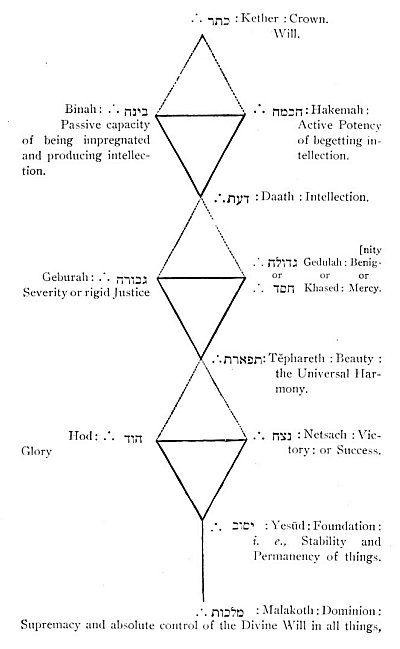The Gnostics derived their leading doctrines and ideas from Plato and Philo, the Zend-avesta and the Kabalah, and the Sacred books of India and Egypt; and thus introduced into the bosom of Christianity the cosmological and theosophical speculations, which had formed the larger portion of the ancient religions of the Orient, joined to those of the Egyptian, Greek, and Jewish doctrines, which the Neo-Platonists had equally adopted in the Occident.
Emanation from the Deity of all spiritual beings, progressive degeneration of these beings from emanation to emanation, redemption and return of all to the purity of the Creator; and, after the re-establishment of the primitive harmony of all, a fortunate and truly divine condition of all, in the bosom of God; such were the fundamental teachings of Gnosticism. The genius of the Orient, with its contemplations, irradiations, and intuitions, dictated its doctrines. Its language corresponded to its origin. Full of imagery, it had all the magnificence, the inconsistencies, and the mobility of the figurative style.
Behold, it said, the light, which emanates from an immense centre of Light, that spreads everywhere its benevolent rays; so do the spirits of Light emanate from the Divine Light. Behold, all the springs which nourish, embellish, fertilize, and purify the Earth: they emanate from one and the same ocean; so from the
p. 249
bosom of the Divinity emanate so many streams, which form and fill the universe of intelligences. Behold numbers, which all emanate from one primitive number, all resemble it, all are composed of its essence, and still vary infinitely; and utterances, decomposable into so many syllables and elements, all contained in the primitive Word, and still infinitely various; so the world of Intelligences emanated from a Primary Intelligence, and they all resemble it, and yet display an infinite variety of existences.
It revived and combined the old doctrines of the Orient and the Occident; and it found in many passages of the Gospels and the Pastoral letters, a warrant for doing so. Christ himself spoke in parables and allegories, John borrowed the enigmatical language of the Platonists, and Paul often indulged in incomprehensible rhapsodies, the meaning of which could have been clear to the Initiates alone.
It is admitted that the cradle of Gnosticism is probably to be looked for in Syria, and even in Palestine. Most of its expounders wrote in that corrupted form of the Greek used by the Hellenistic Jews, and in the Septuagint and the New Testament; and there was a striking analogy between their doctrines and those of the Judeo-Egyptian Philo, of Alexandria; itself the seat of three schools, at once philosophic and religious–the Greek, the Egyptian, and the Jewish.
Pythagoras and Plato, the most mystical of the Grecian Philosophers (the latter heir to the doctrines of the former), and who had travelled, the latter in Egypt, and the former in Phœnicia, India, and Persia, also taught the esoteric doctrine and the distinction between the initiated and the profane. The dominant doctrines of Platonism were found in Gnosticism. Emanation of Intelligences from the bosom of the Deity; the going astray in error and the sufferings of spirits, so long as they are remote from God, and imprisoned in matter; vain and long-continued efforts to arrive at the knowledge of the Truth, and re-enter into their primitive union with the Supreme Being; alliance of a pure and divine soul with an irrational soul, the seat of evil desires; angels or demons who dwell in and govern the planets, having but an imperfect knowledge of the ideas that presided at the creation; regeneration of all beings by their return to the κόσμος νοητός, [kosmos noe_tos], the world of Intelligences, and its Chief, the Supreme Being; sole possible mode of re-establishing that primitive
p. 250
harmony of the creation, of which the music of the spheres of Pythagoras was the image; these were the analogies of the two systems; and we discover in them some of the ideas that form a part of Masonry; in which, in the present mutilated condition of the symbolic Degrees, they are disguised and overlaid with fiction and absurdity, or present themselves as casual hints that are passed by wholly unnoticed.

Moe is the founder of GnosticWarrior.com. He is a father, husband, author, martial arts black belt, and an expert in Gnosticism, the occult, and esotericism.







